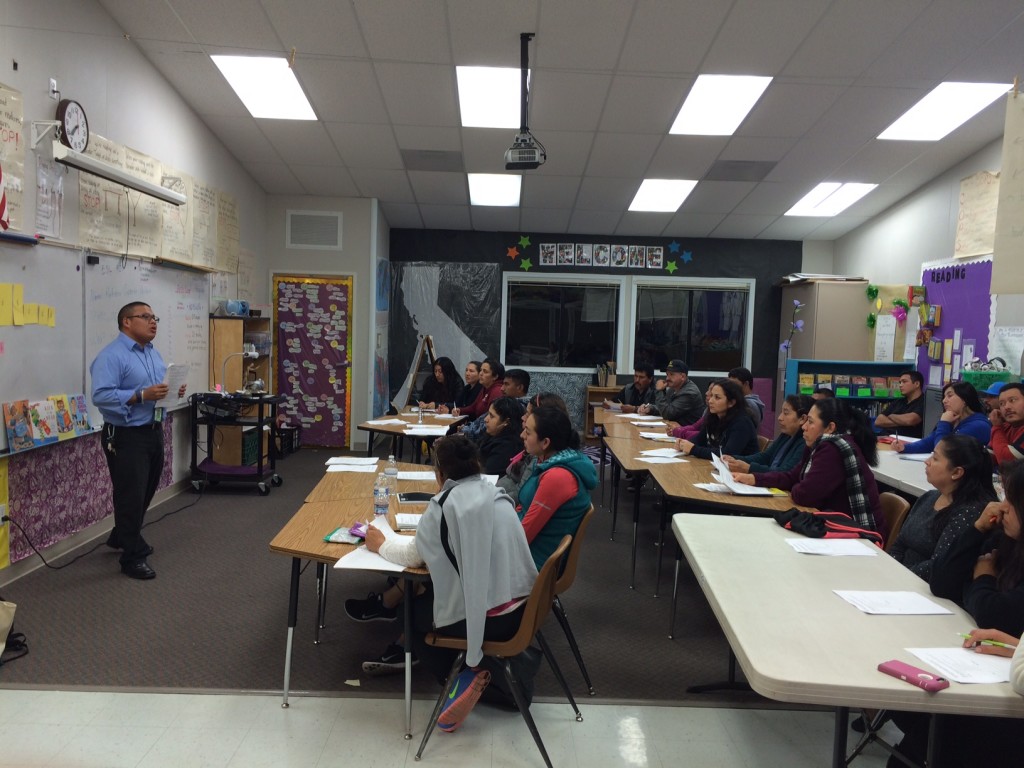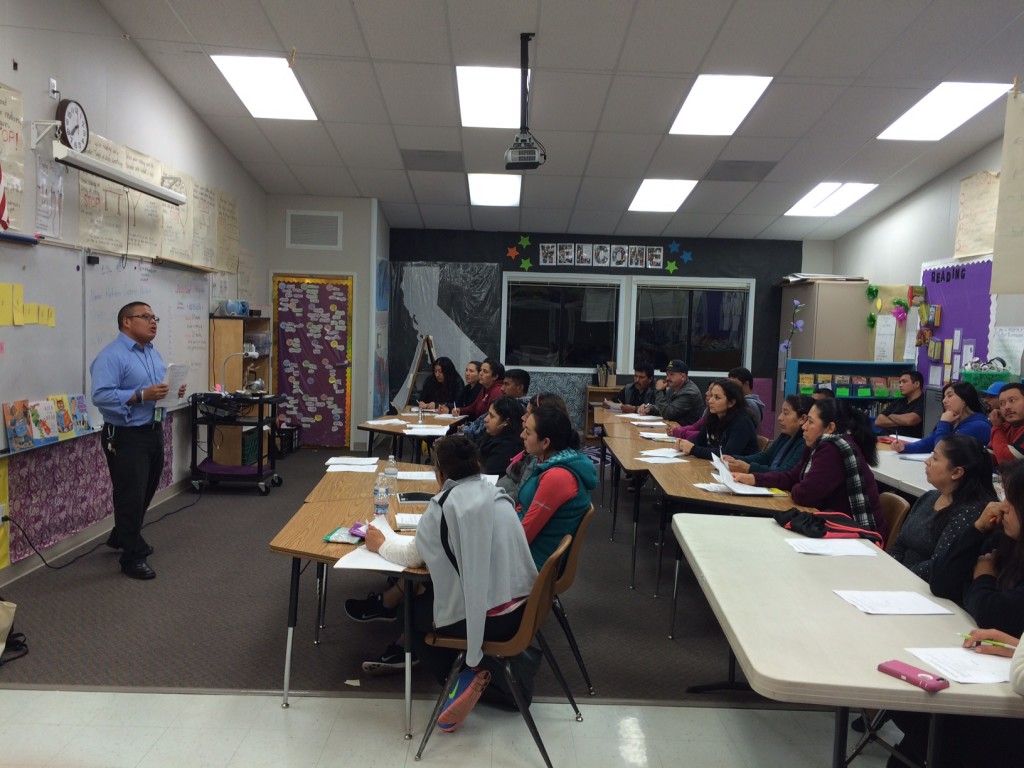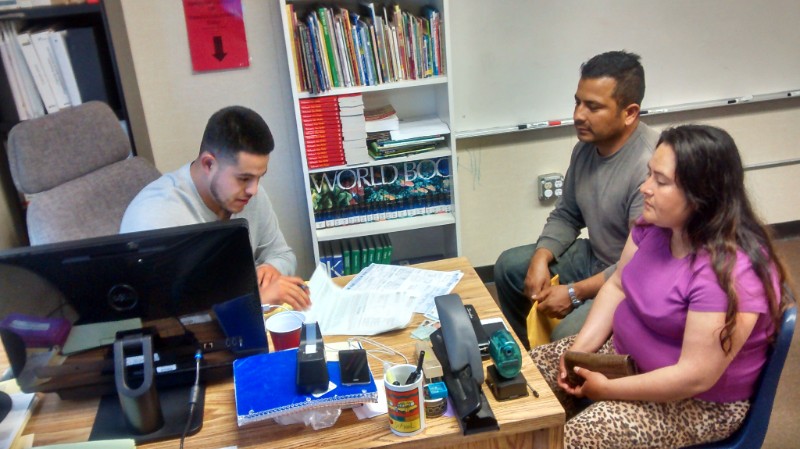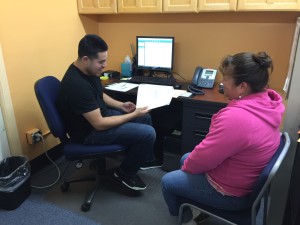Cuando por primera vez en casi una década Puente decidió ofrecer su clase de inglés como segunda lengua (ESL) a nivel de colegio comunitario en Pescadero, el personal no tenía manera de saber si los estudiantes se apuntarían. Esta no era una clase cualquiera, sino una clase especializada de inglés como segunda lengua para adultos del Cañada College centrada en aprender habilidades de lengua para el trabajo.
No tenían que preocuparse. El 23 de febrero la clase inaugural atrajo a tantos estudiantes adultos – mujeres y hombres de 30, 40 y 50 años- que el personal de Puente tuvo que apresurarse a traer dos mesas más para poder sentar a todos dentro del salón de cuarto grado reconvertido de la escuela primaria de Pescadero.
Fue una noche especial. Los miembros de Puente Rita Mancera y Noel Chávez observaban desde la puerta cómo el instructor Gerardo Pacheco daba la bienvenida a los estudiantes a lo que era (en la mayoría de los casos) su primera clase de inglés como segunda lengua a nivel universitario.
Yo fui un estudiante de inglés como segunda lengua como ustedes – le decía el profesor Pacheco a los estudiantes – Si yo fui capaz de hacerlo, ustedes también.
Pacheco tenía 16 años cuando en 1999 él vino solo a los Estados Unidos desde Yucatán y se asentaron en Redwood City. No hablaba inglés.
Recuerdo el día que fui a mi primera clase de inglés como segunda lengua en el Cañada College. Estaba aterrorizado porque todo mundo en la clase ya hablaba inglés. Tomé una decisión justo en ese momento. Me dije a mí mismo: “Gerardo, si lo abandonas ahora, toda tu vida serás un derrotista cuando las cosas se pongan feas. No he lamentado esa decisión porque me dio una educación. Y la educación fue la llave para mi futuro – le dijo a los estudiantes reunidos, que asentían y sonreían.

Gerardo Pacheco y su estudiantes del ESL en sus clase primero en Pescadero.
Su mensaje acerca del futuro era muy apropiado para la ocasión. Este curso de inglés como segunda lengua estaba orientado a la enseñanza de las habilidades en inglés que los estudiantes necesitaban para tener éxito en su puesto de trabajo, tanto el futuro como el presente.
La clase se ofrecía a través de la escuela de adultos La Costa, fruto de una colaboración que sentaría precedente entre el Distrito Escolar Unificado de La Honda-Pescadero y el Distrito Escolar Unificado Cabrillo en Half Moon Bay, junto con Puente y el Cañada College. Las partes eran miembros del Consorcio ACCEL de San Mateo, una iniciativa más amplia a nivel del condado para reforzar las conexiones entre las escuelas de adultos y los colegios comunitarios. La meta es expandir las opciones profesionales para los estudiantes adultos. Se financia en parte mediante una beca estatal.
La colaboración abre una ruta para adultos que han superado los tres niveles de inglés como segunda lengua de Puente y quieren ir más lejos en su educación – dice Noel Chávez, director de educación de Puente.
Queremos que puedan tomar el siguiente paso. Realmente espero que los estudiantes tengan la fuerza para continuar con su educación, ya sea haciendo que las clases del Cañada College en Puente se conviertan en algo permanente en un futuro cercano, o físicamente en el Cañada College – dice Chávez. Él planea conectar con otros colegios comunitarios para que también enseñen en Puente.
No importa dónde vivan o cuál sea su trabajo, los estudiantes pueden imaginarse a sí mismos en sus futuras carreras y el Cañada College les va a dar la información y las habilidades que necesitan para llegar allí – dice Jenny Castello, Profesora/Coordinadora del departamento de inglés como segunda lengua de la universidad.
Queremos siempre que piensen en lo que viene después de la clase de inglés, que piensen a lo grande – dice.
Un punto destacado de la nueva clase de inglés como segunda lengua que va a tener lugar en Puente será que el grupo va a visitar el campus del Cañada College para una serie de presentaciones sobre especialidades y carreras profesionales que están abiertas para los estudiantes de inglés como segunda lengua. Van a oír de miembros del profesorado de Cañada que enseñan todo, desde negocios internacionales y diseño de moda a asistencia médica, y a obtener detalles sobre las cualificaciones para cada carrera. Aprenderán sobre las perspectivas de trabajo en los distintos campos y también sobre las escalas salariales.
Buscamos un punto de encuentro con los estudiantes allá donde se hallen, y les ayudamos a prepararse para la universidad, incluyendo carrera profesional, académica información técnica de la Universidad, además del inglés como segunda lengua – dice Castello. Algunas carreras requieren un certificado mientras que otras pueden requerir un título asociado o algo más avanzado. Ella estima que puede llevar a un estudiante siete años alcanzar un certificado o una titulación si comienza en los niveles más bajos de inglés como segunda lengua.
Abrumador, quizás, pero no imposible. Los estudiantes traen sus propios sueños a una clase como ésta, y muy a menudo estos implican carreras muy lejos de su campo de experiencia. Piensen en Aurelia Morales (no es su nombre real), una recepcionista a tiempo completo que se apuntó a la clase de inglés como segunda lengua de Puente para mejorar su inglés escrito y prepararse para una posible carrera como cuidadora de niños o sustituta en un preescolar local.
Quiero tener más experiencia en campos distintos. No simplemente respondiendo a los teléfonos – dice. Morales tiene otra idea también pero no sabe cómo lograrla. – ¿Usted sabe cuál ha sido siempre mi sueño? De niña mi sueño era educar a otras mujeres que luchan con la violencia. Recuerdo ser testigo de esto en la comunidad. Me gustaría ayudar de alguna manera, quizá en el sector de organizaciones sin ánimo de lucro -.
Estudiantes como Morales se graduarán de esta clase de inglés como segunda lengua con un dominio de los usos prácticos del inglés, tales como rellenar una solicitud de empleo, entrevistarse para un trabajo y describir habilidades de trabajo, explicar metas profesionales por escrito, responder a e-mails, y llamar al trabajo para decir que va a llegar tarde.
El profesor Pacheco se complace enormemente al ver a sus estudiantes tener éxito. Él es un respetado poeta que ganó su MFA en la universidad de San Francisco State, donde ahora enseña escritura creativa. Pero hace menos de 20 años era un inmigrante adolescente trabajando en un lavadero de coches en Menlo Park, ese chico con la escoba llena de espuma.
También fui limpiador. Ya puedes ver que obtener una educación trae sus beneficios. He probado mi propia teoría – dice con una sonrisa.
El programa de educación de adultos de Puente recibe el apoyo generoso de la Silicon Valley Community Foundation, y agradecemos al distrito escolar unificado La Honda-Pescadero por compartir las instalaciones, y de los fondos generales de Puente, que dependen de donaciones de la amplia comunidad de Puente. Haga clic aquí para convertirse en un contribuyente mensual o para hacer una donación para nuestros programas educativos.







